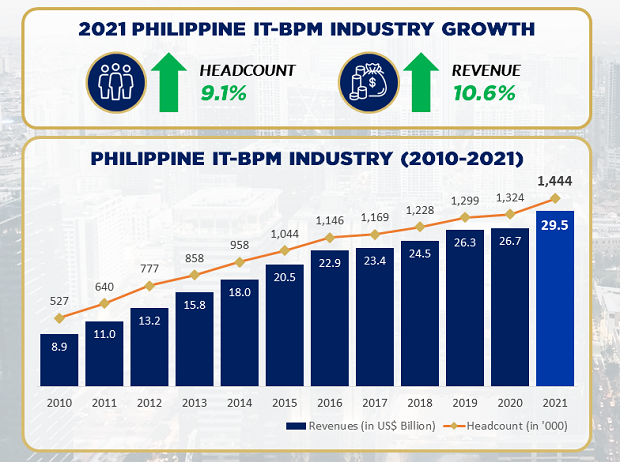The IT and Business Process Management (IT-BPM) industry reinforced its role as a major pillar of the country’s economy as it continued to contribute new jobs and export gains even as Covid-19 crippled other sectors.

According to the IT and Business Process Association of the Philippines (IBPAP), the number of full-time employees (FTEs) in the country increased by 120,000 in 2021, bringing the sector’s total headcount to 1.44 million and registering a growth of 9.1% compared to 2020. The industry also recorded revenues of $29.49 billion in 2021 or a 10.6% jump from the previous year.
“This double-digit growth validates what we had projected — that 2021 performance was beyond recovery; it marks a resurgence for the Philippine IT-BPM sector,” said Jack Madrid, IBPAP president and CEO.
“Preserving jobs, driving investments, stimulating countryside development, and creating demand for real estate — these are the unequivocal contributions of the industry to nation-building.”
Not only did the 2021 figures exceed the forecasted growth for the year, but it also eclipsed the recalibrated 2022 targets of 1.43 million FTEs and $29.1 billion in revenues ahead of schedule, the industry group said.
IBPAP noted that the upsurge can be attributed to:
- Pent-up demand from global customers,
- Higher confidence in work-from-home (WFH) setups by clients in contact centers and business process services, and
- Growth in emerging sub-segments like e-commerce, fintech, healthcare, and technology.
More and more organizations in global business services (GBS) are also incorporating offshoring and outsourcing into their strategic initiatives to improve efficiencies and optimize costs in multiple geographies, according to IBPAP.
“This will spill over into 2022 and continue to boost demand for IT-BPM services across the world. We should not miss out on this opportunity to capture a bigger slice of the global market,” Madrid emphasized.
IBPAP said the sustained growth of the sector will be defined by several factors. Further reliance on offshoring and outsourcing will be spurred by next-generation business models and assets, the talent and skills shortage, and competitive pricing models. Expansion across select horizontals and verticals and increased digital adoption by traditional players will also be key drivers of growth in 2022, it said.
IBPAP said the other end of the spectrum presents three “watchouts” that industry stakeholders must carefully navigate to maximize the country’s growth potential and reinforce its global competitiveness in the year ahead:
- Supply chain resilience from a talent standpoint will be critical amid the intensifying talent war that’s exacerbated by higher attrition rates and growing requirements for emerging and niche skills such as automation, cloud, data and analytics, and cybersecurity.
- Integration of hybrid work models in business strategies will also become more prevalent. Globally, 70% of IT-BPM enterprises are saying that they will be implementing hybrid work arrangements. Locally, 80% of Filipino IT-BPM employees have expressed their preference for a hybrid work model over returning fully onsite.
- Location diversity has also become a priority in the aftermath of the pandemic. Given this, companies will need to leverage off alternative locations and adopt small-scale centers or microsites to achieve more robust business continuity plans (BCPs).
IBPAP said it is also set to publish the Philippine IT-BPM Industry Roadmap 2028 this year, which will serve as the blueprint for the sector’s priorities in digitization, talent, policy shaping, infrastructure, and country branding over the next six years.
Foremost among these imperatives is legislation that will allow the long-term implementation of hybrid work given its rapid adoption in competing locations such as India, Poland, and Malaysia. This has been a focus area of IBPAP in the last few years when it proved meritorious beyond its initial purpose as a BCP, the group said.
Although more recent efforts have been on facilitating a smoother transition back to the office through the extension of the WFH arrangement until September 12, 2022, IBPAP said crucial work has been put into ensuring that the new administration understands why work-from-anywhere (WFX) is essential to the country’s enduring competitiveness and readiness for higher global market share.
IBPAP said it has been working with the government to lay down the building blocks for a consistent and comprehensive policy on hybrid work and to improve ease of doing business for new investors.
“The launch of the Roadmap is very timely because 2022 is a banner year for the Philippines and the IT-BPM industry. Not only are we welcoming a new administration, but we’re also at the precipice of a new age that will reimagine, rethink, and re-envision everything that we know about the sector,” remarked Madrid.
“We are pleased to share that earlier this year, we selected the Everest Group, a renowned global services advisory and research firm with a deep understanding of the global IT-BPM industry, to be our partner in this critical undertaking.”




